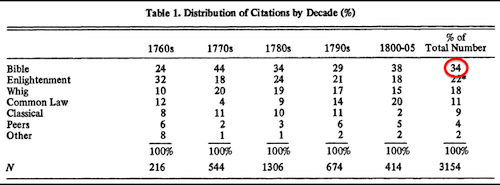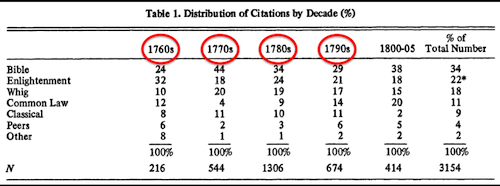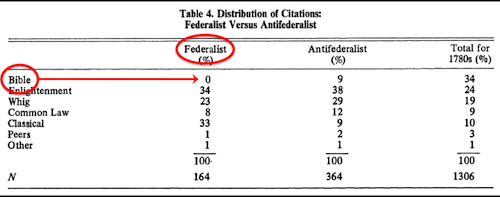This installment of my series debunking the American history lies told by Glenn Beck is about a study published in 1984 in The American Political Science Review, and how that study is misrepresented to make it appear that our founding documents were based on the Bible, especially the Book of Deuteronomy.
(Note: This is part four of an ongoing video series. I would normally provide links to the previous installments, but Vimeo has removed my videos, citing copyright issues, although these videos were well within the limits of "fair use.")
UPDATE: The issue with Vimeo has been resolved. They promptly reviewed my videos and have restored the ones that were removed. So, the first three installments are once again available: Part 1, Part 2, Part 3.
Here's the transcript of what I said in the video, for those who can't watch videos at work, or have slow connections:
The study referred to by Beck and Barton was conducted by Donald S. Lutz of the University of Houston. Lutz published his findings in a 1984 article in The American Political Science Review, and misrepresentations of it began appearing a few years later. The first one was in John Eidsmoe's 1987 book Christianity and the Constitution, which was soon followed by the version most often seen today -- the one created by David Barton in his 1988 book The Myth of Separation.
What revisionists like Barton typically do to distort this study is to accurately present some of the charts of the study's findings, but omit the parts of Lutz's explanations of these findings that explain what the numbers in the charts actually mean. That way they can just replace the real explanations with whatever they want their followers to think the numbers mean.
So, let's start with what Barton said on Beck about the writings of the founders: "34% of their quotes came out of the Bible." That comes from this chart in Lutz's study.

Now, based on this chart alone it really does appear that 34% of the citations in the documents studied came from the Bible. That's because they did. And, without Lutz's explanation of this figure, this chart would seem to support Barton's claim that the Bible, more than any other source, influenced the political thought of the founders.
But let's take a look at Lutz's explanation of that chart:
"...From Table 1 we can see that the biblical tradition is most prominent among the citations. Anyone familiar with the literature will know that most of these citations come from sermons reprinted as pamphlets; hundreds of sermons were reprinted during the era, amounting to at least 10% of all pamphlets published. These reprinted sermons accounted for almost three-fourths of the biblical citations..."
So, in other words, about three-quarters of all the Bible citations that make up that 34% came from sermons, a sub-category of just one of the categories of the types of documents used in the study, and "anyone familiar with the literature," as Barton incessantly claims to be, would know that. And this bumps the Bible down into the range of classical influences for all the documents that weren't sermons, and moves the enlightenment and whig influences into the number one and two spots for all the documents that weren't sermons.
But, of all the findings in this study that are omitted by Barton and the other revisionists, none are nearly as important as those found in the section of Lutz's article titled "The Pattern of Citations from 1787 to 1788."
As seen in the first chart, Lutz broke down the number of citations from all sources by decade.

But, in addition to this, he also singled out the writings from 1787 and 1788, the crucial two year period when our government was actually being formed. The revisionists completely omit this part of the study. Why? Because Lutz found hardly any biblical citations during the time that the Constitution was being written and debated in the press, and, on top of that, not a single one of these biblical references were found in any of the federalist writings in support of the Constitution. The only ones he found were used by the anti-federalists to argue against the Constitution.

Here's what Lutz wrote about this.
"The Bible's prominence disappears, which is not surprising since the debate centered upon specific institutions about which the Bible has little to say. The Anti-Federalists do drag it in with respect to basic principles of government, but the Federalists' inclination to Enlightenment rationalism is most evident here in their failure to consider the Bible relevant."
But omitting pesky little parts of the study like this one, and merely misrepresenting the study's 34% Bible citation figure wasn't good enough for David Barton, so he found a way to inflate that figure, making a whopping 94% of the quotes used by the founders come from the Bible. How did he do this? Well, he took the other sources listed in the study, like Montesquieu, Blackstone, and Locke, and then claimed that because some of these other sources "derived their ideas from the Bible," the founders were indirectly quoting the Bible when they cited these other sources. Barton somehow determined by this method that an additional 60% of the citations in Lutz's study came from the Bible, added this 60% to the already misrepresented 34% from the actual study, and, voilà, 94% of all quotes used by the founders came from the Bible.
In his article, Lutz said that more of the biblical citations he found came from the Book of Deuteronomy than any other book in the Bible, which is why Glenn Beck said that Deuteronomy is "the most quoted out of any of our founding documents." But, besides all those quotes from Deuteronomy, Barton, in his "study," added things like the founders getting the idea for the concept of the separation of powers from the Book of Isaiah, because Isaiah 33:22 says, "For the Lord is our judge, the Lord is our lawgiver, and the Lord is our king." So, there you have it: three branches of government, and they're all "the Lord." He's the judge, the lawgiver, and the king. It's exactly the same as our government -- except for that pesky checks and balances thing, and that minor detail of not having a king who controlled everything.
Barton first published published his "findings" in his 1988 book The Myth of Separation, and repeated it in one of his videos, and from there it spread. Here's Congressman Dan Burton of Indiana using Barton's 94% statistic and other claims in the House of Representatives back in 1993, citing Barton's book nearly verbatim.
Now, I haven't heard Barton use his pumped up 94% statistic in a while, but this really doesn't matter because once Barton puts something out there it takes on a life of its own, and continues to be used whether Barton himself is still using it or not.
In April 2007, it showed up in an article on WorldNetDaily titled Bringing the Bible Back Into Public Schools, by Chuck Norris, a board member and spokesman for the National Council On Bible Curriculum In Public Schools (NCBCPS). Norris was regurgitating the even more distorted version of Barton's claim about the Lutz study that's found on the NCBCPS website's "Founding Fathers" page. The NCBCPS people claim that it was actually the Lutz study, not David Barton, that "found that 94% of the documents that went into the Founding era were based on the Bible," and that it's not just that 34% of the citations Lutz found were from the Bible, but that "34% of the contents" of these documents "were direct quotations from the Bible." This is what I mean by Barton's lies taking on a life of their own. It's like a game of what I call "fundy telephone." Barton puts out the original lie, and it gets repeated over and over for years -- in this case over two decades -- eventually becoming an even bigger lie than Barton started.
And, the use of Barton's lies by the NCBCPS brings me to my final point. Barton does nothing to stop this, even when he obviously has the power to do so. Barton is on the advisory board of the NCBCPS, but apparently his "advice" doesn't include stopping this curriculum from using bogus quotes that even he himself advises his followers not to use.
Quite a few years ago, after being called out on some of his bogus founders' quotes, Barton put out a list of "Unconfirmed Quotations," and advises the readers of his website to "refrain from using them until such time that an original primary source may be found." And yet six of these bogus quotes from Barton's own "Unconfirmed Quotations" list, among them the infamous James Madison Ten Commandments quote, appear in the NCBCPS curriculum. So what, exactly, is NCBCPS advisory board member Barton advising this organization on? How to promote his lies and get them into our public schools?
And, just last week on Glenn Beck, John Hagee repeated one of these bogus quotes that Barton put out there, but now advises his followers not to use: the one about George Washington saying, "It's impossible to rightly govern the world without God and the Bible," while fellow guest Barton just stayed silent and listened to someone spread a quote that he knows is bogus to millions of gullible Americans.
I sometimes get criticized, even by those who think that Barton is a complete charlatan, for coming right out and calling him a liar. They ask me how I can be sure that he's intentionally lying, and not just a really crappy historian. Well, it's moments like that one with John Hagee that expose him as the liar that he is, and that is exactly what I will continue to call him.